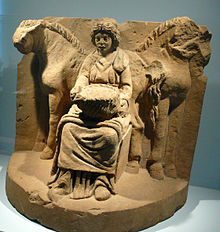Epona
Fernand Benoît found the earliest attestations of a religion of Epona in the Danubian provinces and asserted that she had been introduced in the limes of Gaul by horsemen from the east.
[10] A long Latin inscription of the first century BC, engraved in a lead sheet and accompanying the sacrifice of a filly and the votive gift of a cauldron, was found in 1887 at Rom, Deux-Sèvres, the Roman Rauranum.
[14] The cult of Epona was spread over much of the Roman Empire by the auxiliary cavalry, alae, especially the Imperial Horse Guard or equites singulares augustii recruited from Gaul, Lower Germany, and Pannonia.
[16] As Epane she is attested in Cantabria, northern Spain, on Mount Bernorio, Palencia;[17] as Iccona Loiminna[dubious – discuss] in Portugal on the Lusitanian inscription of Cabeço das Fráguas.
[18] The tale was passed along in the context of unseemly man-beast coupling in Giambattista Della Porta's edition of Magia naturalis (1589), a potpourri of the sensible and questionable, erroneously citing Plutarch's Life of Solon.
Epona is mentioned in The Golden Ass by Apuleius, where an aedicular niche with her image on a pillar in a stable has been garlanded with freshly picked roses.
[25] In 2017, Swiss Folk Metal band Eluveitie released a Gaulish-language song called “Epona” as part of their Evocation II: Pantheon album, praising the goddess The probable date of c. 1380–550 BC ascribed to the giant chalk horse carved into the hillside turf at Uffington, in southern England, may be too early to be directly associated with Epona and may not actually represent a horse at all.
[29] In the medieval Welsh collection of stories known as the Mabinogion, the regal figure of Rhiannon rides a white horse, whose slow, effortless gait supernaturally outpaces all pursuit.
Wrongly accused of killing her offspring, Rhiannon has to play the role of horse for seven years as punishment, offering to carry travellers to the court and telling them her story; she also wears the work-collar of an ass.
She and her son, who is fathered by the sea-god (cf Romano-Greek Poseidon, god of horses and the sea), are sometimes described as mare and foal[30] Ronald Hutton is skeptical of connections claimed between Epona and Rhiannon; the latter is a much later, literary creation, though it also draws on oral traditions now lost.
[31] A south Welsh folk ritual called Mari Lwyd (Grey Mare) is still undertaken in December, which some folklorists likewise have held up as an apparent survival of the veneration of Epona, but again there is no firm evidence to support the age, origins or purpose of the practice.




